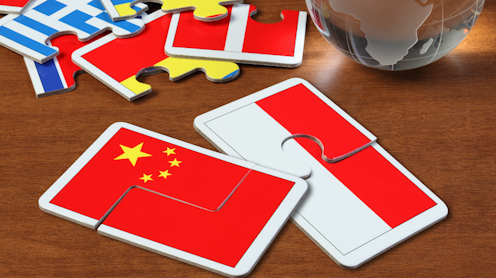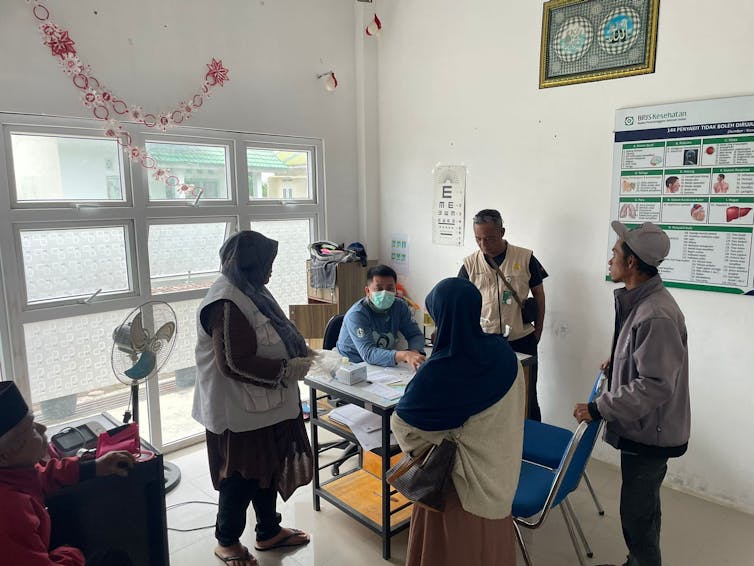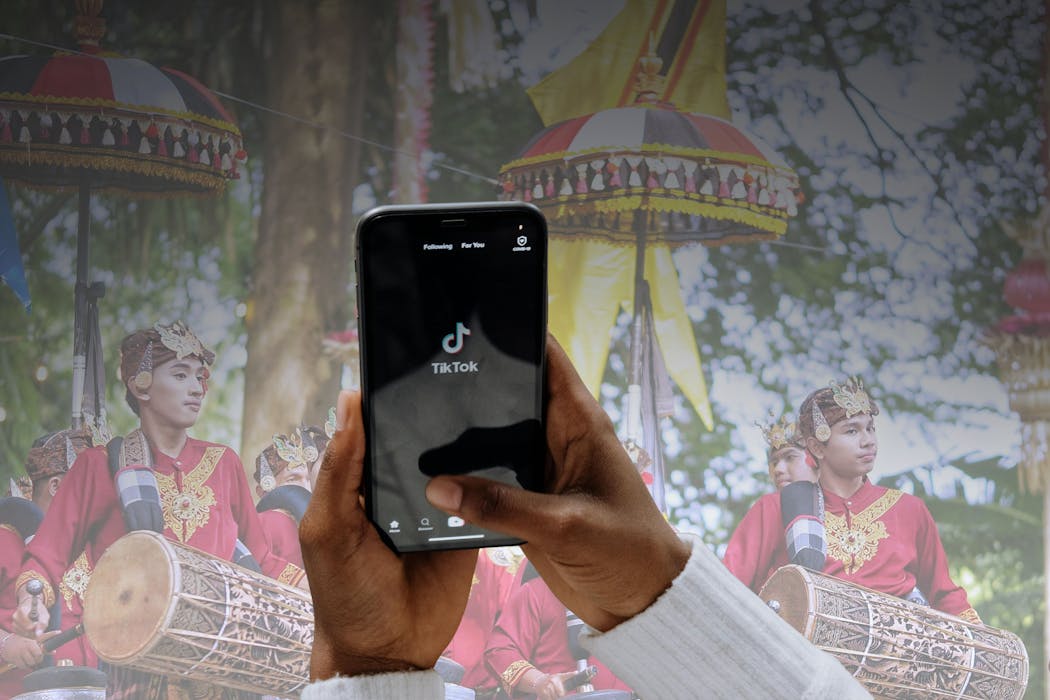Indonesian political parties build close relations with China despite their anti-communist ideology
- Written by Muhammad Zulfikar Rakhmat, Assistant Professor in International Relations, Universitas Islam Indonesia (UII) Yogyakarta

Southeast Asia’s largest economy Indonesia has been increasingly intimate[1] in various sectors with the world’s second-largest economy, China.
China-Indonesia ties not only occur between governments and businesses. Several Indonesian political parties and the Chinese Communist Party (CCP), China’s founding and sole ruling party[2] are also forging ties. This phenomenon is quite interesting given the world’s most populous Muslim majority has held a strong anti-communist position[3] since the mid-1960s.
My ongoing research about the actors involved in China-Indonesia relations reveals the mutual benefits the Chinese Communist Party and Indonesia’s political parties gain from these collaborations.
From secular to Islamic parties
Indonesia banned communism in 1966; it was considered a threat following an alleged coup attempt by the country’s Communist Party (PKI). In the early 2000s, Indonesia’s fourth president, Abdurrahman Wahid, failed in his attempt to revoke[4] the ban. The stigma against communism in Indonesian society remains[5].
This is why most political parties in Indonesia do not want to be associated with China due to its communist ideology.
Unlike China’s one ruling party system, Indonesia is a multi-party country. There are two broad camps[6]: secular and Islamic parties.
The first camp includes the current ruling party PDIP[7] (Indonesian Democratic Party of Struggle), Democratic Party[8] (Partai Demokrat), Golkar[9] (Party of the Functional Groups), Gerindra[10] (Great Indonesia Movement Party) and NasDem[11] (National Democrat).
The Islamic parties include PKS[12] (Prosperous Justice Party), PAN[13] (National Mandate Party), PPP[14] (United Development Party) and PKB[15] (National Awakening Party).
However, even Islamic parties that have had a long, tense history[16] with communism since the early 1950s are reportedly pursuing ties with the Chinese Communist Party.
At least five Indonesian political parties have established[17] ties with the CCP.
These include the country’s major parties the PDIP, Gerindra, the Democratic Party, Golkar, and the PKS.
The involvement of parties like the PKS and Gerindra is quite interesting, given these parties often regard China’s growing power as a communist threat[18].
It’s also been reported the Islamic party PPP (United Development Party) has developed a relationship with the Chinese Communist Party, although it has rejected such claims[19].
Wide scope
As early as 2008, Golkar’s members and Chinese Communist Party officials held[20] a meeting to share experiences on party management. Since then, the two parties have been organising[21] follow-up meetings between their high-ranking officials in Beijing and Jakarta.
Golkar politician Ace Hasan Syadzily said[22] that many parties in Indonesia, not only Golkar, have cultivated collaborations with the Chinese Communist Party.
The scope of this party-to-party cooperation ranges from meetings, exchanges on party organising, to regeneration.
Golkar and the Chinese Communist Party’s meeting in 2008 resulted in a Memorandum of Understanding (MoU)[23] covering all aspects related to the regeneration and party organising.
Meanwhile, the PDIP and the CCP have organised several meetings to discuss cooperation to increase human and financial resources.
In 2013, the PDIP sent[24] 15 of its cadres to visit Shanghai, Guiyang and Beijing to observe children’s health care centres and learn about the development of agricultural sectors in China’s rural areas[25].
In their visits to Guiyang, delegates from the PDIP learned[26] about how local governments fostered the development of Small and Medium Enterprises in the health industry. They also attended[27] a number of workshops on political party management.
In 2015, PDIP’s chairwoman and Indonesia’s former president Megawati Soekarnoputri visited Shenzhen to inaugurate the Indonesia-China Cooperation Center building[28]. The building is named after her father, Sukarno, Indonesia’s first president. This visit further enhanced the PDIP’s relationship with the CCP.
During the visit, Megawati spoke[29] on a panels titled “Political Leadership: New Consensus for Political Party”, at the International Conference of Asian Political Parties forum in Beijing.
Chinese authorities also invited[30] the PKS, the National Mandate Party (PAN) and the National Awakening Party (PKB) to conduct comparative studies, especially on the Hui Muslim Ethnic Autonomous Region in Ningxia, in an effort to maintain a positive image of China’s Xinjiang policy.
Mutual benefit
Political experts on the Chinese Communist Party, Julia Bader and Christine Hackenesch, argue[31] that from the CCP’s perspective, strengthening party-to-party relations with Indonesia could be part of its soft-power approach to increasing the legitimacy of its growing economic interests in the country.
There have been criticism of China[32] among certain parties’ members and supporters in Indonesia.
China sees this party-to-party cooperation as a way to improve its standing and a gateway for expanding its foothold.
The harmonious relationship will also bring opportunities for future Chinese investment in the country.
China wants to build a good relationship with Indonesia’s ruling coalition party[33], especially in the lead up to Indonesia’s 2024 general election.
From the perspective of Indonesian parties, the aim is more than just to maintain good relations but also to bring about projects in various sectors.
This also opens up opportunities for the Indonesian parties to become grant distributors[34], enabling them to gain political support from Islamic boarding schools and educational institutions.
With the 2024 election coming soon, collaborating with China may help them receive funding for their political activities and ensure Chinese investments in Indonesia in the future.
References
- ^ increasingly intimate (theconversation.com)
- ^ China’s founding and sole ruling party (www.cfr.org)
- ^ strong anti-communist position (www.hrw.org)
- ^ revoke (jawawa.id)
- ^ remains (www.usnews.com)
- ^ two broad camps (carnegieendowment.org)
- ^ PDIP (books.google.co.kr)
- ^ Democratic Party (www.demokrat.or.id)
- ^ Golkar (www.partaigolkar.com)
- ^ Gerindra (partaigerindra.or.id)
- ^ NasDem (nasdem.id)
- ^ PKS (pks.id)
- ^ PAN (pan.or.id)
- ^ PPP (ppp.or.id)
- ^ PKB (www.britannica.com)
- ^ a long, tense history (www.rappler.com)
- ^ established (news.detik.com)
- ^ communist threat (www.tagar.id)
- ^ rejected such claims (news.detik.com)
- ^ held (www.merdeka.com)
- ^ have been organising (www.merdeka.com)
- ^ said (www.cnnindonesia.com)
- ^ a Memorandum of Understanding (MoU) (www.merdeka.com)
- ^ sent (www.antaranews.com)
- ^ China’s rural areas (www.antaranews.com)
- ^ learned (www.antaranews.com)
- ^ attended (www.antaranews.com)
- ^ inaugurate the Indonesia-China Cooperation Center building (www.liputan6.com)
- ^ spoke (www.liputan6.com)
- ^ invited (epaper.mediaindonesia.com)
- ^ argue (www.taylorfrancis.com)
- ^ criticism of China (www.solopos.com)
- ^ Indonesia’s ruling coalition party (www.gatra.com)
- ^ become grant distributors (www.republika.co.id)
Authors: Muhammad Zulfikar Rakhmat, Assistant Professor in International Relations, Universitas Islam Indonesia (UII) Yogyakarta





